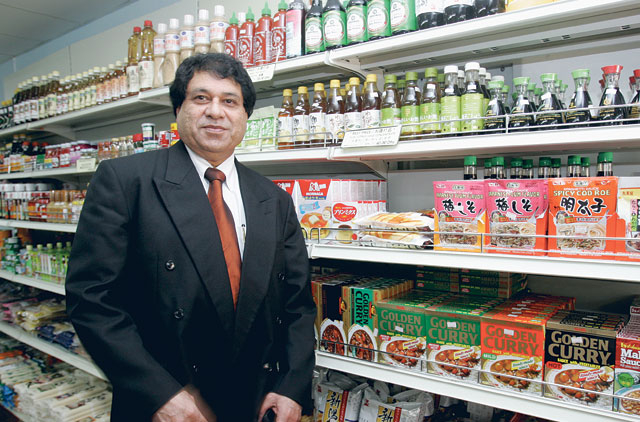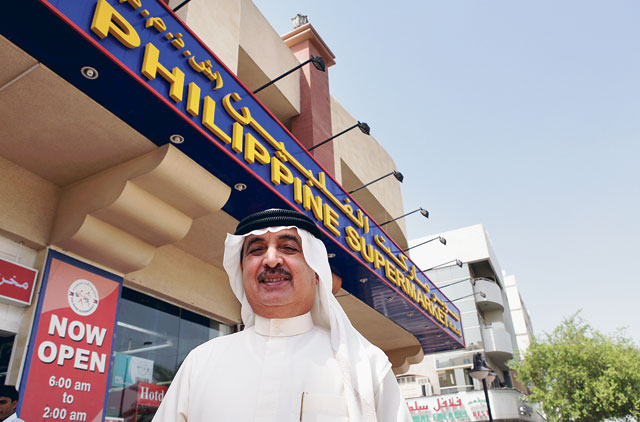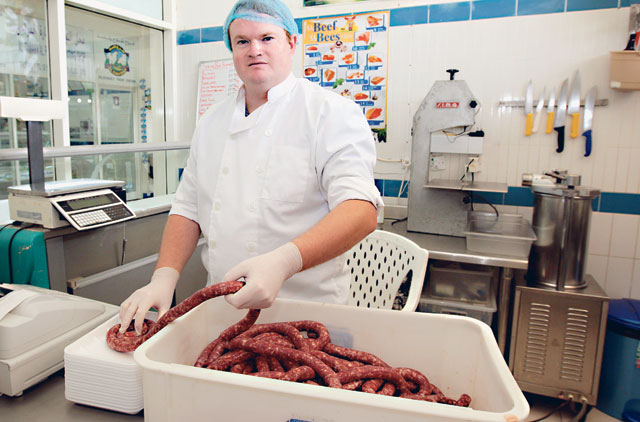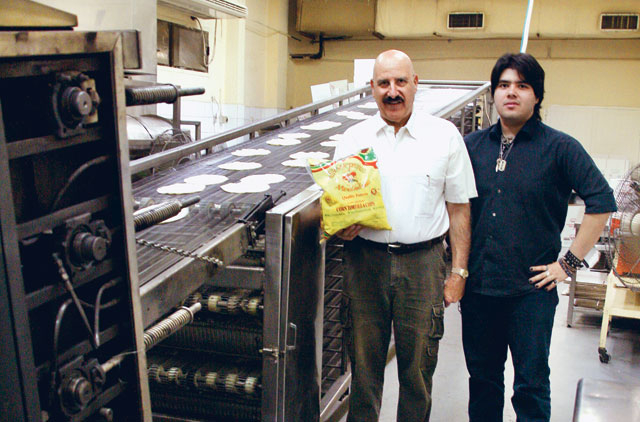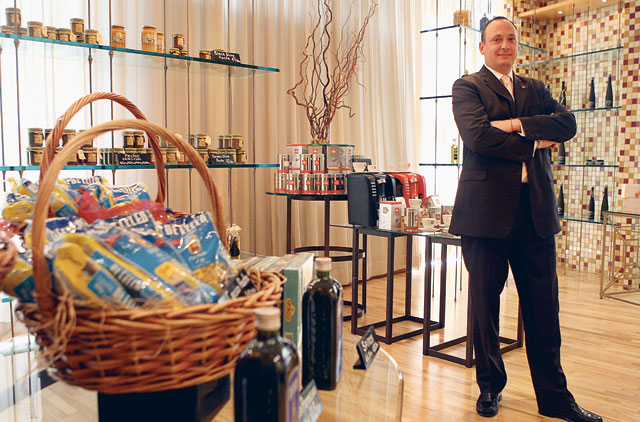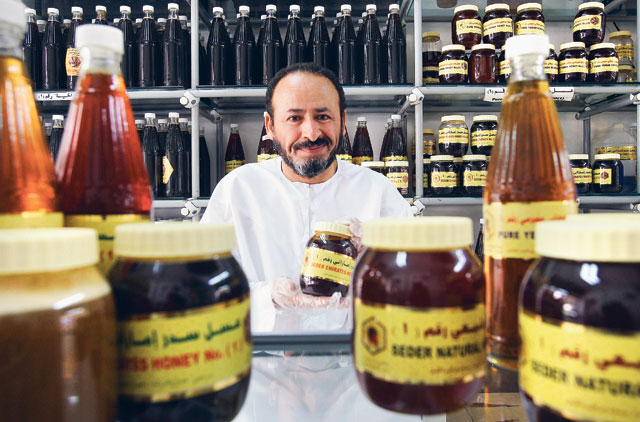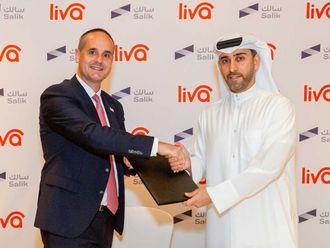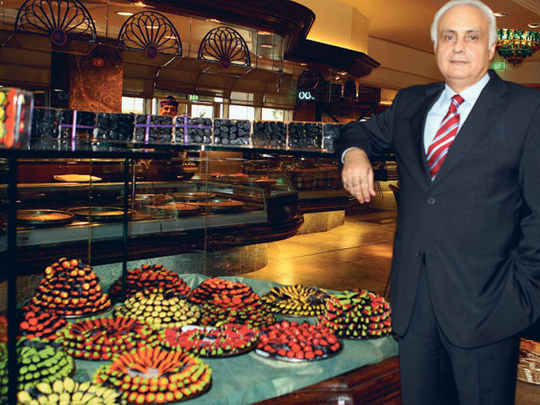
In a country where around 80 per cent of the population is made up of expatriates, hundreds of niche businesses catering to the UAE's multinational population have sprung up, offering many of these various communities a taste of home.
JAPAN
Dean's Fujiya supermarket
Even though the Japanese community in Dubai isn't that big, their food is. For connoisseurs of the cuisine looking to recreate the recipes in their home kitchen, supermarket aisles dedicated to Japanese supermarkets are often small and limited. However Dean's Fujiya Japanese Supermarket offers the close to the full spectrum, just minus the fresh produce.
The shop which has been open for five years supplies most of the country's Japanese restaurants. However, Deans Trading Company managing director Sreenivas Panikkan said the company was feeling the repercussions of the downturn.
"The hotels are suffering from low occupancy which also affects the Japanese restaurants in those hotels," he said. "This in turn affects us. Also, the demand for other foods such as Chinese or Thai is much higher since it's more available and the prices are much cheaper. Japanese products on the other had are very expensive so the customer base is very limited."
Of their retail customers, Panikkan said they were a mixture of nationalities. As Dean's Fujiya was one of the only supermarkets dedicated to Japanese food in the region, customers came from Syria, Jordan and Lebanon to buy their products.
"We sell many Japanese items that are only available here so we get customers from all over the GCC," Panikkan said. "In the region, the highest concentration of Japanese people are in Dubai and Qatar."
Deans Fujiya Japanese Supermarket, Oud Metha, Dubai, 04-337 0503
Oishii Nippon
Set up by Japan’s Ministry of Agriculture, Forestry and Fisheries as part of a drive to promote Japanese food in the Arab region, this petite shop
offers the best produce out of Japan. While fruit is expensive, the store attracts a steady flow of loyal customers. Sachiko Saito, chief ambassador of Oishii
Nippon (which means ‘a taste of Japan’ in Japanese) said while the store had only been open for one year, she had seen a lot of business from locals. Only five per cent of their customers are Japanese and the rest are emiratis.
“Even though the prices are high, once customers get to know the quality they often come back,” Saito said. While the fruit is very juicy, it comes in
the traditional packing, in Japanese cloth which can be re-used and converted into a hand bag.
Jumeriah Centre, Shop No.6, Dubai, 04-3494718
CHINA
Zhujun International mini-mart
Tucked away in the myriad of streets behind the Madinat Zayed Gold Centre lies a quirky grocery that caters for Abu Dhabi's Chinese community. The Zhujun International mini-mart stocks a wide variety of weird and wonderful Chinese products including dumpling skins, jellyfish and salty, dried beancurd.
There is also a wide array of Chinese pickles, garnishes, noodles and sauces.
Kristy Chen, Assistant Manager of Zhujun, said: "We were the first Chinese grocery in Abu Dhabi when we opened two years ago. However, over the last few years several other Chinese outlets have opened so now we face more competition.
"We used to sell our produce to supermarkets and restaurants across the UAE but that is no longer the case. I think many places buy from Chinese retailers in Dubai where product prices are cheaper."
The mini-mart experiences busy trading periods several times a year for big events such as Chinese New Year and the Chinese Moon Festival. There are around 30,000 Chinese residents in Abu Dhabi and the Chinese embassy estimates there are approximately 200,000 living in the UAE.Chen added: "I think most people know about our store through word of mouth. We don't really advertise apart from in the free Chinese newspaper that we give away at our store. Our customers are predominantly Chinese and Filipino and a handful of other nationalities. However, Chinese food is not to everybody's taste." Our most popular products are tofu, Chinese herbs, Chinese tea and cooking sauces."
Zhujun International Trading, Abu Dhabi 02-6316061
PHILIPPINES
Philippine Supermarket
With Filipinos making up one of the UAE's largest communities, it's no surprise that supermarkets and restaurants dedicated to Filipino food staples populate areas of Dubai. With shops in Satwa and Bur Dubai, the Philippine Supermarket is one of the speciality supermarkets designed to keep Dubai's Filipinos well supplied.
Having been in the industry for five years, Abdul Razagh Mohammadi, owner of the Philippine Supermarket, has several more planned for Dubai, Ajman, Sharjah and Abu Dhabi.
"I've always had good relations with the Filipino community. When I noticed the number of this community increasing in the UAE, it came to mind to set up a Filipino supermarket in places where there is a big Filipino community," said Mohammadi.
According to Mohammadi, the minimal sales in the store in Satwa reach around Dh25,000 daily while the store in Murraqabat earned about Dh40,000 a day.
Rush hour lasts between 5pm and 10 or 11pm when about 300 to 400 people visiting the store every day.
The fastest-moving items were Filipino snacks such as halo halo and sago, and fish such as tinigang and bangos.
"One of the main reasons Filipinos come here is because I'm not trying to have more margin on the price. I'm trying to have less profit but more people. Filipinos always check the prices and if it's cheaper somewhere else they'll go there," said Mohammadi.
Philippine Supermarket, Satwa, Dubai, 04-345 0178.
EGYPT
Green Tree supermarket
Green Tree Supermarket which has been open since 1986 has proved very popular among the Egyptian and Sudanese community.
"When we opened this shop, we identified the products that people in the community wanted. We realised that the majority of their customers were Egyptian and Sudanese and there was demand for those," said Um Nashad co-owner of the shop, which she shares with her husband.
Their products include rumi cheese, Egyptian white cheese, Egyptian honey, lentils, foul and dates.
There are also certain Egyptian sweets such as bisco masr which are popular during Eid.
"There's a big community that comes from Ajman, Abu Dhabi, Al Ain, Ras Al Khaimah. We get a lot of people coming from Abu Dhabi and Dubai because our products are not available elsewhere," Um Nashad said.
"The sales depend on the season. During Eid it's always busy. But there are always customers as there's a big Egyptian consumer base here," she said.
Green Tree supermarket, Clocktower Roundabout, Sharjah, 06-5630902
SOUTH AFRICA
SA Butcher
South Africans love their meat which is evident from the meat-dominated menus of South African restaurants such as Meat and Co. When brothers Trevor and Brian Ridley couldn't find a butchery that sold their much loved Boerewors and biltong, they decided to make their own. Just over two years later, their homely enterprise has now extended to become the Springbok Butchery in Abu Dhabi and Wagonwheel Butchery in Al Ain.
"The business started in my kitchen. I started making sausages which initially wasn't for the intention of selling. Friends visiting would ask for me to make more and from there it snowballed into a business," said Brian.
He added that they were the only butcher that offered South African meat. While there had been investment offers to expand, Brian said he wanted to ensure the company maintained the personal touch it was well known for.
"One of my main missions is to keep the whole personal touch that [has] been lost because of supermarkets. Before you used to be able to chat to your butchers and get the exact cuts and meats you want," Brian said.
As a family team, Brian and Trevor take pride in the fact that their business was a butchery catering to South Africans who comprise 80 per cent of their customer base.
"We have a fairly steady demand from the South African market which are predominantly located in Dubai but we've identified the need to diversify a little bit," said Brian
South African delicacies on offer include biltong, droewors and boerewors. Branching out to suit the local market, they have also added camel biltong to their product list which according to them is proving to be very popular.
Upon request, the SA Butchery also dishes up the South African braii favourite, lamb on a spit.
As part of their business expansion, the brothers said they were planning to bring in a wider range of meat such as venison imported from South Africa.
www.sabuthcery.com
GCC
Bee Kingdom
For the past 25 years, Assad Abdullah has been running Bee Kingdom, a shop that specialises in selling local honey. His knowledge and passion for all things honey have been passed on through the generations of his family which is originally from Egypt.
"I've chosen to set up in Dubai because the economy is good here. In Egypt, where I'm from, the economy isn't that great so the products wouldn't sell," Abdullah said.
Abdullah's honey comes from Yemen, Oman, Jordan, Pakistan and the UAE which he orders in the form of honeycombs. This pure form is then bottled for sale and is organic and without any sugar preservatives.
Because of its high quality, his honey doesn't come cheap.
The most expensive type which he sells for Dh600 per kilogramme is harvested in the mountains where the flowers are much more rare and the honey is harder to find. Along with its sweet taste, the honey also comes with medicinal properties.
"There are different uses of honey, not just for food," Abdullah said. "It can be used to cure infections, stomach problems, kidney problems, help increase immunity, sexual impotency. I've had cases where customers were finding it hard to have children.
"I gave them honey mixtures and soon after they were able to conceive. My breakfast, lunch and dinner all have honey in it. Honey eases the digestion process and doctors prescribe it to patients."
Abdullah said his mixtures, which differs according to the ailment, includes a mixture of herbs such ginseng, royal jelly and saffron. He added that he'd seen his customers grow up and start families, and now does business with their children.
Bee Kingdom, Bur Dubai, 04-3522455
MEXICO
Senor Pepe's Mexican Foods
Burt Alfieri, managing director of Senor Pepe's is an old hand at selling Mexican products in the region. After working in Saudi Arabia for a few years, he opened a fast food Mexican shop in 1982. After that he ventured to Bahrain to open a similar restaurant. In 1989, he came to the UAE to start Senor Pepe's Mexican Foods.
"We started with a small tortilla oven, couple of machines and grew from that," Alfieri said. "The market was small when we first started and we didn't do more than $1,000 worth of sales during the first couple of months. At that time there was only one Mexican restaurant in Dubai."
Now they supply throughout the Middle East region. Alfieri said Senor Pepe's was the first to bring Mexican food to the region, and the Dubai business had grown to include over 10 restaurants. Now it's not just Mexican restaurants that are seeking their product, the wrap scene has increased their tortilla sales considerably. "This business has been successful for us and our major market has been in Dubai for 20 plus years," Alfieri said. "The awareness of Mexican food [is] growing in the region and there is a lot of opportunity in that market."
Alfieri said Mexican was one of the fastest growing ethnicities of food worldwide as more people used the spices and sauces in fusion cuisine.
The company's products were sourced from Mexico, US and Peru. Senor Pepe's also produces its own salsa and sauces, he said.
"Almost all the hotels buy something from us. We also cater to the Tex-Mex restaurants and to the more authentic style restaurants and the hotels," Alfieri said.While retail was currently a very small part of their business, the company wanted to expand its offering to include a mini-mart.
Senor Pepe's Mexican Food, Sharjah, 06-5338522
ITALY
Prego's
Prego's has gained a reputation on the UAE dining scene as one of the country's stand-out restaurants for reasonably priced, authentic Italian fare.
But the outlet at Abu Dhabi's Beach Rotana is more than just your normal eatery; it also features the capital's first wine bar and a delicatessen stocked with goods imported directly from Italy.
The delicatessen has become a favourite among Abu Dhabi's expatriate community as it stocks a wide range of Italian meats and cheeses.
Moritz Klein, General Manager of Prego's at the Beach Rotana, said: "Although Prego's receives a lot of word of mouth, we don't rely on it and we use many opportunities to advertise the restaurant. We create regular restaurant promotions and bring in visiting chefs, as well as being very active within the community.
"Since we closed our Italian restaurant ‘Come Prima' some seven years ago, our Chief Operating Officer Omar Z. Kaddouri — who was the General Manager back then — saw the need for a much trendier type of Italian restaurant. The idea of Prego's was born; an open-spaced restaurant with a high ceiling, lots of light, huge windows and a delicatessen that would give residents and tourists access to Italian products not normally available in supermarkets here."
Prego's accepts relatively high overheads but does not sell any of its imported goods to other restaurants or supermarkets in the UAE.
Klein added: "Most products are imported and therefore quite costly. However we accept having a higher cost and don't want to pass on this inflated cost to our customers.
Prego's, Beach Rotana, Abu Dhabi, 02-6979011
LEBANON
Wafi Gourmet
The pull of good Lebanese food is in its freshness, something which Wafi Gourmet does well. The upscale supermarket, which has been open for nine years, is designed and styled after the traditional Arabian souqs. Its popularity among Arab shoppers with refined tastes is spread across its five UAE outlets.
Fadi Hallak, procurement manager, explains: "If you have a look at the layout, we have different food displays for the fruits, mezzes, spices etc. It's interactive and the clients can order from the display directly".
The deli says it imports about 70 to 80 per cent of its food from Lebanon and the rest is sourced from the region, depending on demand.
"If we have a request we'll source and go for the best quality and price. Our original suppliers are from Lebanon, but sometimes we get from elsewhere such as Turkey, it depends on the season," Hallak said.
Mezze made in-house provides a unique product line for other Lebanese supermarkets in Dubai. The shop also showcases a wide range of spices and herbs from the region, and their own, very popular stuffed figs which, according to Hallak, can only be found in Wafi Gourmet.
Because of the type of product on offer, Hallak said demand stayed steady during the downturn.
"People are willing to pay this price to get this kind of product. They follow us for our unique items and pay a lot for them. Because of this, we have a loyal customer base," he said.
While the majority of their clients were from Arab countries, Hallak said they were seeing an increasing number of Europeans, such as Russians.
Wafi Gourmet, Wafi Shopping Centre, 04-3244433
Do you look for ethnic foods when you shop? Do you purchase any specific items? Or do you prefer experiencing ethnic foods in restaurants?


